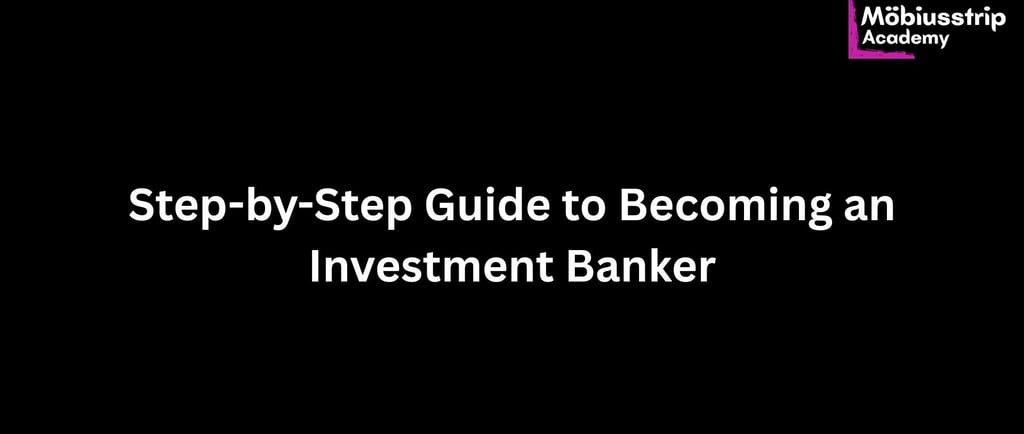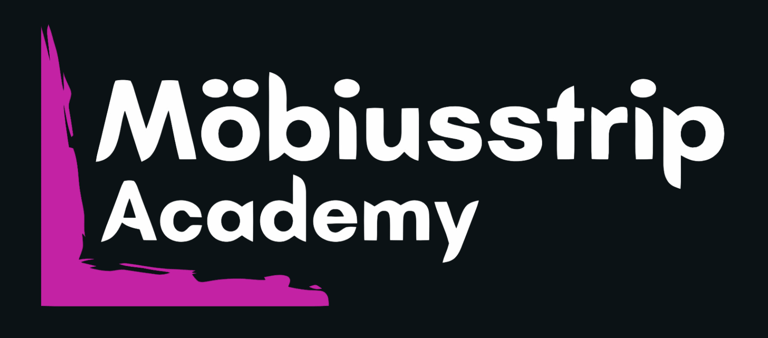New batch starts in September 2025
Step-by-Step Guide to Becoming an Investment Banker
Becoming an investment banker isn’t for the faint of heart. It’s one of the most competitive, high-pressure, and demanding paths in finance. But for those who want a fast-paced career where the stakes are high and the learning curve is steep, it offers unmatched exposure, career mobility, and compensation. The journey isn’t mysterious, but it is rigorous. Here’s a clear, step-by-step guide to how you actually break into investment banking—whether you’re still in school or already working and looking to pivot.
Mr. Mitul Mewada ( Founder, Möbius Strip Academy)
4/14/20255 min read


Step-by-Step Guide to Becoming an Investment Banker
Becoming an investment banker isn’t for the faint of heart. It’s one of the most competitive, high-pressure, and demanding paths in finance. But for those who want a fast-paced career where the stakes are high and the learning curve is steep, it offers unmatched exposure, career mobility, and compensation. The journey isn’t mysterious, but it is rigorous. Here’s a clear, step-by-step guide to how you actually break into investment banking—whether you’re still in school or already working and looking to pivot.
Step 1: Understand What Investment Banking Really Is
Before chasing the title, understand the job. Investment bankers help companies raise capital and provide strategic advisory services, primarily around mergers and acquisitions (M&A), IPOs, debt issuance, and restructuring. It’s not about day trading or managing portfolios—that’s asset management. Bankers work insane hours (think 70-100 hours per week in junior roles), often under tight deadlines, building pitch decks, running financial models, and coordinating deal logistics. If you’re just in it for the paycheck or prestige, the burnout will hit hard. Know what you’re signing up for.
Step 2: Start with the Right Education
Your academic foundation matters. Most investment bankers start with a bachelor’s degree in finance, economics, accounting, or business administration. Target schools (think Ivy League or top-tier universities with strong finance programs) matter because investment banks recruit heavily from them. If you’re not at a target or semi-target school, the road is harder but not impossible—you’ll just have to be more aggressive with networking and internships. GPA is also crucial. Banks screen resumes heavily for academic excellence, and anything below a 3.5 makes it significantly harder to land interviews, especially at the analyst level.
Step 3: Get Relevant Internships—Early and Often
Internships are your gateway. In this field, prior experience is currency. Aim to get your first finance-related internship during your sophomore year or even freshman summer. It doesn’t have to be in investment banking right away. Think wealth management, corporate finance, boutique advisory firms, or even Big Four firms. By your junior summer, you want to land a summer analyst position at a bank. This internship is the real audition—if you do well, you’ll likely get a return offer for a full-time analyst role. Miss that shot, and you’re climbing a steep hill post-graduation.
Step 4: Learn the Technical Skills That Matter
Technical proficiency separates real candidates from pretenders. At a minimum, you need to master Excel and PowerPoint. You should be able to build a 3-statement financial model, know your way around discounted cash flow (DCF) valuations, comps, precedent transactions, and LBO models. Courses and certifications can help if you’re self-taught—Wall Street Prep and Breaking Into Wall Street are popular options. Knowing accounting cold is non-negotiable. You don’t need a CPA, but you should understand how the income statement, balance sheet, and cash flow statement connect. When you get in the interview room, they’ll test you on this.
Step 5: Network Relentlessly
In investment banking, it’s not just what you know, but who knows you. Cold emailing is a rite of passage. Reach out to alumni, attend finance club events, LinkedIn message analysts and associates—anything to get on someone’s radar. Be respectful of their time, ask smart questions, and don’t immediately ask for a job. Your goal is to build relationships, gain insights, and eventually earn referrals. Informational interviews matter more than you think. One conversation can turn into an interview if you make a strong impression. If you’re not networking weekly, you’re falling behind.
Step 6: Prepare Rigorously for Interviews
Interview prep is serious business. Investment banking interviews typically have two parts: behavioral and technical. On the behavioral side, expect questions like “Tell me about yourself,” “Why investment banking?”, and “Tell me about a time you worked under pressure.” These need polished, practiced answers with real substance. For the technical part, be ready for valuation questions, accounting adjustments, modeling logic, and brainteasers. Most banks will also throw in a paper LBO or ask you to walk through a DCF. Do mock interviews. Record yourself. Have sharp answers. It’s a test of preparation as much as knowledge.
Step 7: Ace the Summer Analyst Role
If you’ve landed a summer analyst position, the job isn’t done—it’s just beginning. Your main goal now is to earn a return offer. Show up early, stay late, triple-check your work, and be coachable. Most junior roles are about execution and reliability. Can you turn comments quickly? Can you build models without mistakes? Can the team trust you under pressure? Do the little things well. Ask smart questions, but don’t overstep. Be a workhorse, not a diva. Keep your head down, perform consistently, and build rapport with the team. Most firms extend full-time offers to their top interns.
Step 8: Land the Full-Time Role
If you get the return offer, accept it unless you have a better offer already locked. If you didn’t get one, you’re in the off-cycle recruiting grind. This is harder but not hopeless. Keep networking. Reach out to boutiques and middle-market banks, who often hire year-round. Some regional firms will take on strong candidates who missed the on-cycle window. You might even consider a related role—corporate finance, Big Four advisory, or even private equity analyst programs—and lateral into banking within a year. Flexibility and persistence are key here.
Step 9: Consider a Top MBA for Career Switching or Advancement
If you didn’t break into banking after undergrad, or you’re trying to pivot from another field, a top MBA can be your ticket in. Banks heavily recruit from schools like Wharton, Booth, Columbia, and Harvard. Pre-MBA, aim to get into finance-adjacent roles to build a credible narrative. During business school, get involved in the finance club, build your technical chops, and recruit aggressively during the internship cycle. Post-MBA roles are more senior (associate level), but the expectations are higher. You’ll need to show leadership, execution ability, and strong communication skills.
Step 10: Stay in—or Use It as a Launchpad
Once you’re in, you’ll either grind for a few years or use the experience as a springboard. Many analysts leave after two years to go into private equity, hedge funds, corporate development, or venture capital. Some stay and climb the ladder to associate, then VP, then director or MD. Few make it all the way to the top. Burnout is real. But even if you leave, the brand and skill set stay with you. Investment banking gives you a crash course in business, modeling, dealmaking, and client management—all of which are transferrable and valuable in other sectors.
Bonus: What If You’re a Career Changer or Late Bloomer?
f you didn’t go to a top school, didn’t intern at Goldman, and didn’t start at 22—don’t panic. There’s still a path. You’ll need to build a strong narrative, develop serious technical skills, and hustle harder. Start in a finance-related role, take courses, network aggressively, and be willing to start at a smaller firm or boutique bank. The big banks may not bite at first, but experience plus persistence can open doors. Also, fintech, corporate M&A, and startup fundraising roles can build overlapping skill sets that may eventually allow you to pivot into a deal-making role
Final Thoughts
Becoming an investment banker takes strategy, stamina, and sacrifice. It’s not about just being smart—it’s about being prepared, persistent, and practical. It’s a business that rewards those who take initiative, handle pressure, and stay sharp under stress. Whether you’re a student trying to break in or a professional making a pivot, follow the roadmap, focus on execution, and know that the climb is steep—but the view can be worth it.
